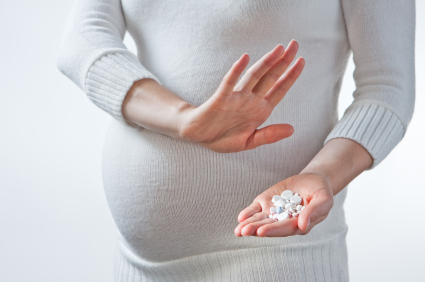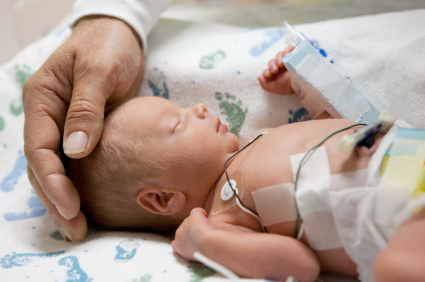Maternal Anxiety Affects Information Filtering in the Infant Brain, Choline Could Help
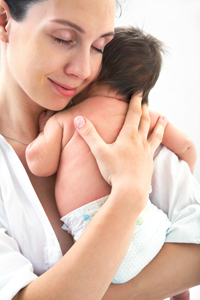 Sensory gating is a process by which the brain filters out unimportant information, to avoid flooding higher cortical centers with irrelevant stimuli. New research from Randal Ross and colleagues shows that infants of mothers with anxiety have deficits in the way their brains inhibit response to this type of irrelevant information.
Sensory gating is a process by which the brain filters out unimportant information, to avoid flooding higher cortical centers with irrelevant stimuli. New research from Randal Ross and colleagues shows that infants of mothers with anxiety have deficits in the way their brains inhibit response to this type of irrelevant information.
Mothers who were rated higher on the trait of anxiety had paradoxically lower levels of the inflammatory cytokine interleukin 6 at week 16 of their pregnancy, and their one-month-old infants showed more deficits in sensory gating. The reasons for these relationships requires further investigation.
Choline is a nutrient found in liver, muscle meats, fish, nuts, and eggs, and it may help. In a 2013 article in the American Journal of Psychiatry, Ross and colleagues showed that the supplement phosphatidylcholine (which converts to choline), taken during the second and third trimesters of pregnancy (at doses of 6300 mg/day, the equivalent of about three eggs) and followed up with 700 mg/day in the infant, led to improvements in sensory gating in the infants. These infants went on to have fewer behavioral problems as toddlers.
Ross and colleagues suggest that pre- and post-natal choline supplementation may be able to reverse the effects of maternal anxiety on infants. The researchers believe it could be helpful in the prevention of schizophrenia, as insufficient cerebral inhibition (decreased sensory gating) is a characteristic of that illness as well.
Study Finds No Substantial Risk of Infant Cardiac Problems from Antidepressant Use During Pregnancy
In the past there has been some concern that selective serotonin reuptake inhibitor (SSRI) antidepressants taken during pregnancy could increase an infant’s risk of cardiac problems. There was particular concern that the SSRI paroxetine could lead to right ventricular outflow tract obstruction, and sertraline could lead to ventricular septal defects. A 2014 study by KF Huybrechts et al. in the New England Journal of Medicine analyzed data from 949,504 women in a Medicaid system from three months before pregnancy until one month after delivery during the years 2000-2007.
Infants born to mothers who had taken antidepressants during their first trimester were compared to infants whose mothers had not taken antidepressants. In total, 6.8% or 64,389 women had used antidepressants in their first trimester.
While the rate of cardiac defects in newborns was greater among those mothers who had taken antidepressants (90.1 infants per 10,000 infants who had been exposed to antidepressants versus 72.3 infants per 10,000 infants who had not been exposed to antidepressants), this relationship diminished as confounding variables were removed. The relative risk of any cardiac defect after taking SSRIs was 1.25, but this decreased to 1.12 when restricted to only those mothers who were diagnosed with depression, and to 1.06 when the researchers controlled for things like depression severity. (All relative risk numbers were calculated with a 95% confidence interval.)
The researchers concluded that there is no substantial risk of increased cardiac defects in children born to mothers who took antidepressants during their first trimester.
Transgenerational Transmission of PTSD
At a recent scientific meeting, Rachael Yehada showed that PTSD-like traits could be passed transgenerationally. Mothers in New York City who were pregnant on September 11, 2001 and developed post-traumatic stress disorder (PTSD) produced children with low cortisol in their blood (a sign of PTSD). If the fathers had PTSD during the mother’s pregnancy, the children had high cortisol.
These gender-related findings have some parallels in studies of rodents. When a rat pup is separated from its mother for 15 minutes, the mother is overjoyed to see the pup return and licks and grooms it excessively. This maternal overprotection yields an animal with lifelong low cortisol through an epigenetic process. The glucocorticoid receptor gives a feedback message to suppress cortisol, and glucocorticoid receptors are increased in the pups’ brains because of lower methylation of the DNA promoter for glucocorticoid receptors.
If a father has PTSD, there is more methylation of the promoter for glucocorticoid receptors and less expression of them in the forebrain. There is also less feedback suppression of cortisol and the baby exhibits high cortisol.
The methylation of the glucocorticoid receptors in the offspring’s white blood cells is highly correlated (r=0.57, p<0.005, n=23) with methylation in the parent’s white blood cells.
Loss of Appetite or Weight in Depressed Parents Predicts Depression in Children
 Depression in a parent is one of the factors that best predicts whether a young person will develop depression. Since depression symptoms can vary greatly from person to person and some symptoms are known to be more heritable than others, new research is investigating whether a parent’s profile of symptoms affects their child’s likelihood of developing the illness. A 2013 study by Mars et al. in the Journal of Clinical Psychiatry suggests that loss of appetite or weight in a parent with depression is the symptom that most strongly predicts new onset of depression and depressive symptoms in their offspring.
Depression in a parent is one of the factors that best predicts whether a young person will develop depression. Since depression symptoms can vary greatly from person to person and some symptoms are known to be more heritable than others, new research is investigating whether a parent’s profile of symptoms affects their child’s likelihood of developing the illness. A 2013 study by Mars et al. in the Journal of Clinical Psychiatry suggests that loss of appetite or weight in a parent with depression is the symptom that most strongly predicts new onset of depression and depressive symptoms in their offspring.
The study observed 337 parent-child pairs. The parents (mostly mothers), who had a history of recurrent unipolar depression, ranged in age from 25–55 years, and their children ranged from 9–17 years. The study lasted four years, during which the families participated in three assessments. Parents’ symptoms were recorded and children were also assessed for symptoms or new development of depression. Thirty percent of the offspring whose parents reported weight loss or low appetite were found to have new onset of depression at followup, compared to nine percent of the offspring whose parents did not have these symptoms.
There are nine symptoms used to diagnose depression in the Diagnostic and Statistical Manual for Mental Disorders: low mood, loss of interest (anhedonia), loss of energy, change in appetite or weight, change in sleep, low self-esteem or guilt, suicidality, psychomotor slowing (retardation), and loss of concentration or indecisiveness. Of these, parental loss of appetite or weight was the only symptom that predicted depression in a child. Interestingly, the severity of parental depression or the presence of other health problems in the parent did not account for the emergence of illness in the children.
Women with Bipolar Disorder at Higher Risk for Postpartum Depression
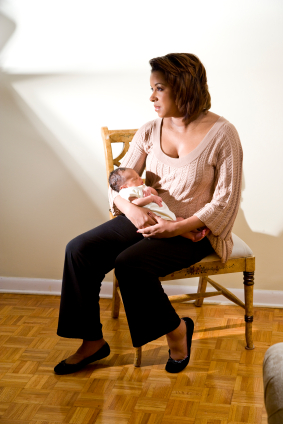 The risk of having a depressive episode during pregnancy compared to afterward have not often been studied. A 2011 review article by Viguera et al. in the American Journal of Psychiatry compared rates of affective episodes among women with bipolar I and II disorders and recurrent major depressive disorder, both during pregnancy and the postpartum period. Risks were higher for women with bipolar disorder.
The risk of having a depressive episode during pregnancy compared to afterward have not often been studied. A 2011 review article by Viguera et al. in the American Journal of Psychiatry compared rates of affective episodes among women with bipolar I and II disorders and recurrent major depressive disorder, both during pregnancy and the postpartum period. Risks were higher for women with bipolar disorder.
Among women with bipolar disorder, 23% experienced mood episodes during the pregnancy, while 52% had an episode in the months after giving birth. Among women with unipolar depression, 4.6% had a mood episode during pregnancy, while 30% did during the postpartum period, which is about double the risk seen in the general population. Depression was the most common type of morbidity the women experienced before and after giving birth.
Risk factors associated with mood episodes during pregnancy included (in descending order): younger age at illness onset, previous postpartum episodes, fewer years of illness, bipolar disorder, fewer children, and not being married. Risk factors associated with postpartum episodes included: younger age at illness onset, illness during pregnancy, bipolar disorder, fewer children, and more education.
Editor’s Note: The risk of postpartum depression increases from 15% in the general population, to 30% among women with unipolar disorder, to 50% in women with bipolar disorder. Special precautions should be taken to monitor and treat depression during and after pregnancy, in all women but particularly in those with a prior history of unipolar or bipolar disorder.
No Relationship Between SSRIs in Pregnancy and Stillbirths or Neonatal Mortality
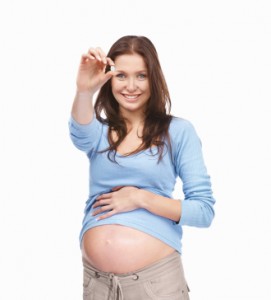 Much has been written about the use of selective serotonin reuptake inhibitor (SSRI) antidepressants during pregnancy. In a review of 920,620 births in Denmark (1995 to 2008) that Jimenez-Solem published this year in the American Journal of Psychiatry, no link was found between any of the SSRIs used in any trimester and risk of stillbirth or neonatal mortality. The only exception was a possible association of three-trimester exposure to citalopram and neonatal mortality.
Much has been written about the use of selective serotonin reuptake inhibitor (SSRI) antidepressants during pregnancy. In a review of 920,620 births in Denmark (1995 to 2008) that Jimenez-Solem published this year in the American Journal of Psychiatry, no link was found between any of the SSRIs used in any trimester and risk of stillbirth or neonatal mortality. The only exception was a possible association of three-trimester exposure to citalopram and neonatal mortality.
Editor’s Note: These new data may be of importance to women considering antidepressant continuation during pregnancy when there is a high risk for a depressive relapse. A maternal depressive episode (like other stressors such as anxiety or experiencing an earthquake) during pregnancy does convey adverse effects to the child, so appropriate evaluation of the risk/benefit ratio or staying on an antidepressant through a pregnancy is important.
Reminder: Multiple Risks for Fetus in Mothers Treated with Valproate
In pregnant women, exposure of the fetus to the anticonvulsant valproate (VPA or Depakote) is associated with a variety of serious problems that include congenital malformations, developmental delay, and autism.
The major congenital malformations that can result from valproate exposure include spina bifida, which results in lifelong paralysis of the child’s lower limbs.
Developmental delay resulting from valproate exposure can cause an average loss of 9 IQ points compared to children exposed to other anticonvulsant drugs in utero. The effects appear to be in part dose-related and dependent on the intensity of combination treatment with other agents. These deficits were originally seen in children at 3 years of age and were shown to persist in six-year-olds according to an article by Meador et al. this year in Lancet Neurology.
Now in addition, fetal exposure to valproate has been liked to autism and related disorders in an 11-year longitudinal study published this year in the Journal of Neurology, Neurosurgery and Psychiatry. A diagnosis of a developmental disorder occurred in 17% of children whose mothers were on valproate as opposed to 2% whose mothers were on carbamazepine and 7% whose mothers were on lamotrigine.
Neurologists are increasingly recommending that all women of childbearing age who are on a treatment regimen including valproate be treated with folic acid and vitamins B6 and B12, in the hopes that these might mitigate valproate’s effects on the fetus in the case of an unplanned pregnancy. The effectiveness of these vitamins has not been directly demonstrated. However, the study by Meador et al. did show that children of mothers who took prenatal folic acid supplements had IQs on average 7 point higher than children whose mothers did not. The benefit was seen only when mothers were already taking folic acid when they became pregnant and was not observed in children of mothers who began taking it after the first trimester.
Women of childbearing age should avoid valproate and if this is not possible, they should carefully protect themselves against an unwanted pregnancy. Women with bipolar disorder are 3.9 times more likely to have unplanned pregnancies than women of similar age in the general population. These data suggest the importance of careful education about birth control in patients with bipolar illness so that pregnancies can be planned for periods of good health and so that appropriate pharmacological measures can be taken.
Preterm Birth Is a Risk Factor for Bipolar Disorder
A study published in the Archives of General Psychiatry in 2012 sampled over one million births in Sweden and suggested that preterm birth (from 32 to 36 weeks) doubled the risk that a child would develop bipolar disorder later in life. Those born even earlier had a sevenfold increased risk for bipolar disorder.
Editor’s Note: A robust research literature indicates that schizophrenia is related to obstetrical and other pre- and perinatal medical problems. Now it seems bipolar disorder may be as well, with some caveats. Low Apgar score (which indicates difficulties at birth) and delayed growth were not found to relate to bipolar risk. Thus something about the shortened preterm development seems to convey the risk. The authors suggest that there may be different types of factors that predispose a person to develop bipolar disorder, and that in some people the illness may have development origins.
These data also fit with observations that only about 50% of patients with bipolar disorder have a positive family history of the illness. Thus, while bipolar disorder does run in families and has a strong genetic basis in many instances, there are many people who develop the illness without having this genetic/familial risk. Very preterm birth appears to be one other contributing risk factor, presumably among many others. Understanding the neurobiological mechanisms occurring before birth that mediate this risk may lead to direct preventive measures to lessen the risk. In the meantime, traditional measures supporting good maternal and fetal health are a good place to start. These include regular prenatal checkups, good nutrition, and prenatal vitamins that include high doses of folic acid.
Parental Nurturing Linked to Greater Hippocampal Volume in Young Children
An article published by Medscape reports that in a recent study by Dr. Joan Luby of Washington University School of Medicine in St. Louis, non-depressed preschool children whose parents showed more nurturing behaviors during a mildly stressful task were found to have hippocampal volume almost 10% greater than their peers whose parents showed fewer nurturing behaviors. The hippocampus affects cognitive functioning and emotion regulation.
Unfortunately, parental nurturing did not effect the hippocampal volume of children with early-onset depression.
Dr. Luby and colleagues think their findings could have “profound public health implications and suggest that greater public health emphasis on early parenting could be a very fruitful social investment.”
“The finding that early parenting support, a modifiable psychosocial factor, is directly related to healthy development of a key brain region known to impact cognitive functioning and emotion regulation opens an exciting opportunity to impact the development of children in a powerful and positive fashion”.
Mothers’ SSRI Use May Lead to Increased Risk of Pulmonary Hypertension in Infants
The New York Times summarized findings about the effect of mothers’ antidepressant use on enfants from an article published by Kieler et al. in the British Medical Journal this year.
Researchers have long suspected a link between the use of selective serotonin reuptake inhibitors, or S.S.R.I.’s, and [pulmonary hypertension in babies], but previous studies have been small and inconclusive (with results ranging from there being no link to a six times greater risk).
This research, based on 1.6 million births in Denmark, Finland, Iceland, Norway or Sweden from 1996 to 2007, showed that among women using S.S.R.I.’s, the risk of persistent pulmonary hypertension for infants more than doubled (particularly for use late in pregnancy). It’s still a small risk: 3 in 1000 births, as opposed to 1.2 per 1000 births overall. But it’s a small risk of a serious problem.
Pulmonary hypertension, Dr. Juliette Madan, a pediatrician at the Dartmouth Hitchcock Medical Center explained, is diagnosed when an infant struggles to get enough oxygen into her lungs, and therefore into her bloodstream. The condition can be deadly, although Dr. Madan said that it’s usually treatable — with possible lifelong consequences.
But other research suggests that untreated depression during pregnancy has its own risks, including pre-term birth and low birth weight. Given that, how should a pregnant woman and her doctor weigh the competing risks?
See the New York Times for a discussion on how to balance mother’s health with babies’ health.



